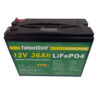The market for uninterruptible power supplies (UPS) is experiencing significant change thanks to lithium-ion battery technology, which gives businesses an alternative that offers many advantages over conventional valve-regulated lead-acid (VRLA) UPS batteries, including a significantly lower total cost of ownership (TCO).
The chemical composition of the substances used in the battery’s electrodes and electrolytes is the primary distinction between a lithium-ion battery and a VRLA battery. Most lithium-ion batteries have a carbon-based anode and a metal oxide cathode (positive terminal) (negative). The lithium salt is dissolved in an organic solvent to form the electrolyte solution. The cathode and anode of a lead-acid battery, on the other hand, are made of lead dioxide, and the electrolyte is a type of sulfuric acid.
The fundamental technology that underpins a car battery also applies to VRLA batteries. A valve or vent that permits the outflow of extra hydrogen gas that may be created while charging is referred to as being “valve regulated.” They are much more prevalent than Lithium-ion since they have been used for decades in UPSs, although this is changing for some very good reasons.
Lithium-ion UPS benefits
When compared to VRLA for UPS batteries, lithium-ion offers at least four key advantages.
1. Increased battery life
VRLA batteries have a three to five-year life expectancy, thus throughout the UPS’s expected 10-year lifespan, they’ll probably need to be replaced at least once and possibly twice. On the other hand, lithium-ion batteries have a lifespan of about 10 years, which means they should last as long as the UPS. Therefore, there is little to no need for UPS maintenance. Additionally, compared to VRLA batteries of comparable capacity, Lithium-ion batteries can endure significantly more charge/discharge cycles, adding to their durability.
2. More compact, lightweight, and flexible
Additionally, lithium-ion batteries are 40% to 60% lighter and 40% to 60% smaller than their VRLA counterparts. This gives installation alternatives and makes it much simpler to put the UPS and its batteries in racks or elsewhere. Companies can receive significantly greater runtime in the same amount of space – or the same runtime in a smaller space – because of the reduced size of lithium-ion UPS batteries. This can significantly impact the protection of these applications because edge computing and smaller data center space are in high demand.
3. A larger temperature range
The third advantage of lithium-ion batteries over VRLA is their tolerance for greater temperatures. Without experiencing any performance impairment, lithium-ion batteries can withstand temperatures of up to 40° C/104° F. This qualifies them for use in abrasive industrial settings like plant floors or outdoor applications.
4. Enduring and requiring less upkeep
Up to twice as long as VRLA batteries, lithium-ion batteries have a longer life. Lithium-ion UPS batteries can last 8 to 10 years (or more), which is frequent as long as the UPS itself. In contrast to the normal lifespan of a VRLA battery, which is 3 to 5 years. That might mean that the battery lasts the whole lifespan of the UPS, saving you money on maintenance costs and lowering the likelihood of downtime. Additionally, lithium-ion batteries have a longer lifespan of 8 to 10 years since they can endure more charge/discharge cycles than VRLA batteries: 3,000 to 5,000 cycles as opposed to 200 to 500 cycles.
5. No performance degradation at higher temperatures
In comparison to VRLA batteries, lithium-ion batteries can sustain higher temperatures without experiencing performance deterioration. VRLA batteries lose nearly half their life expectancy for every 15°F temperature increase above 77°F, which results in a significant loss of performance. Up to 104°F can be tolerated by lithium-ion batteries without any performance issues. This translates into the capability of using UPSs with Lithium Ion batteries in more extreme, non-traditional settings (e.g., industrial and Edge applications).
6. Quicker recharging
The UPS battery must be quickly recharged to its full capacity after being required to supply backup power. Lithium-ion batteries only require 2 to 4 hours to charge from 0% to 90% of their full runtime capacity, but VRLA batteries can take up to 12 hours. The likelihood that you will experience another outage before your UPS batteries are fully charged is decreased as a result.
7. System for integrated battery management (BMS)
Lithium-ion batteries, unlike VRLA batteries, feature an integrated battery management system (BMS) that guards against problems with temperature, current, and overcharging or undercharging the battery cells. To enhance performance and lengthen the battery’s life, the BMS continuously optimizes battery charge.
8. The total cost of ownership is lower
Due to a variety of reasons, lithium-ion batteries can reduce the total cost of ownership by up to 50% during their lifetime.
- Greater lifespan compared to conventional VRLA batteries
- Ability to resist greater temperatures and more charge-discharge cycles
- Reduced maintenance expenses – under normal conditions, batteries do not need to be replaced
- Reduced space requirements and installation costs due to a smaller footprint.
Uses of lithium-ion UPS
The range of possible applications for UPSs with Lithium-ion batteries is expanded by their smaller size and lighter weight. Applications that would not have been feasible for a UPS based on VRLA are now feasible.
Examples comprise:
- Systems for retail point-of-sale, comprising the floor-mounted registers and card readers as well as the computers in the back office that support them. A UPS powered by lithium-ion would be unobtrusive even on a retail floor because of its modest size.
- ATMs, whether they are independent structures or a part of bank branches.
- Applications for the Internet of Things (IoT), such as network security for sensors attached to everything from vending machines to streetlights, are aiding the adoption of smart cities.
- Utility infrastructure, oil rigs, and sensor networks on farms for applications in smart agriculture are examples of remote, outside locations.
Advantages of choosing Lithium-ion batteries over VRLA
In terms of battery technology for uninterruptible power supply (UPS) systems, lithium-ion is a game-changer. Although the industry has relied on valve-regulated lead-acid (VRLA) batteries for many years, lithium-ion batteries for UPS systems provide advantages that can’t be ignored.
There are many advantages of lithium-ion batteries over VRLA batteries, including the following:
- Greater useful life, up to two times
- Less weight makes installation simpler
- Same performance [power] in a smaller container, thanks to the reduced size.
- Less time is needed to prepare for another power outage due to faster recharging times.
- Savings on Total Cost of Ownership (TCO) of up to 50%
- Has the capacity to withstand greater operating temperatures
- Remote monitoring using the Integrated Battery Management System (BMS)
- Safer for the Environment – Green
Final Word
The point is that there are many standards and best practices available to guarantee the secure development and application of lithium-ion batteries for UPS systems. Just make sure your UPS supplier is knowledgeable about all the regulations and that all of its goods adhere to them.
The majority of big businesses were so thrilled by lithium-ion technology that they changed the UPSs to lithium-ion models. They are far smaller in size than VRLA-based UPSs, and they anticipate that the 10-year battery life will result in lower TCO.




